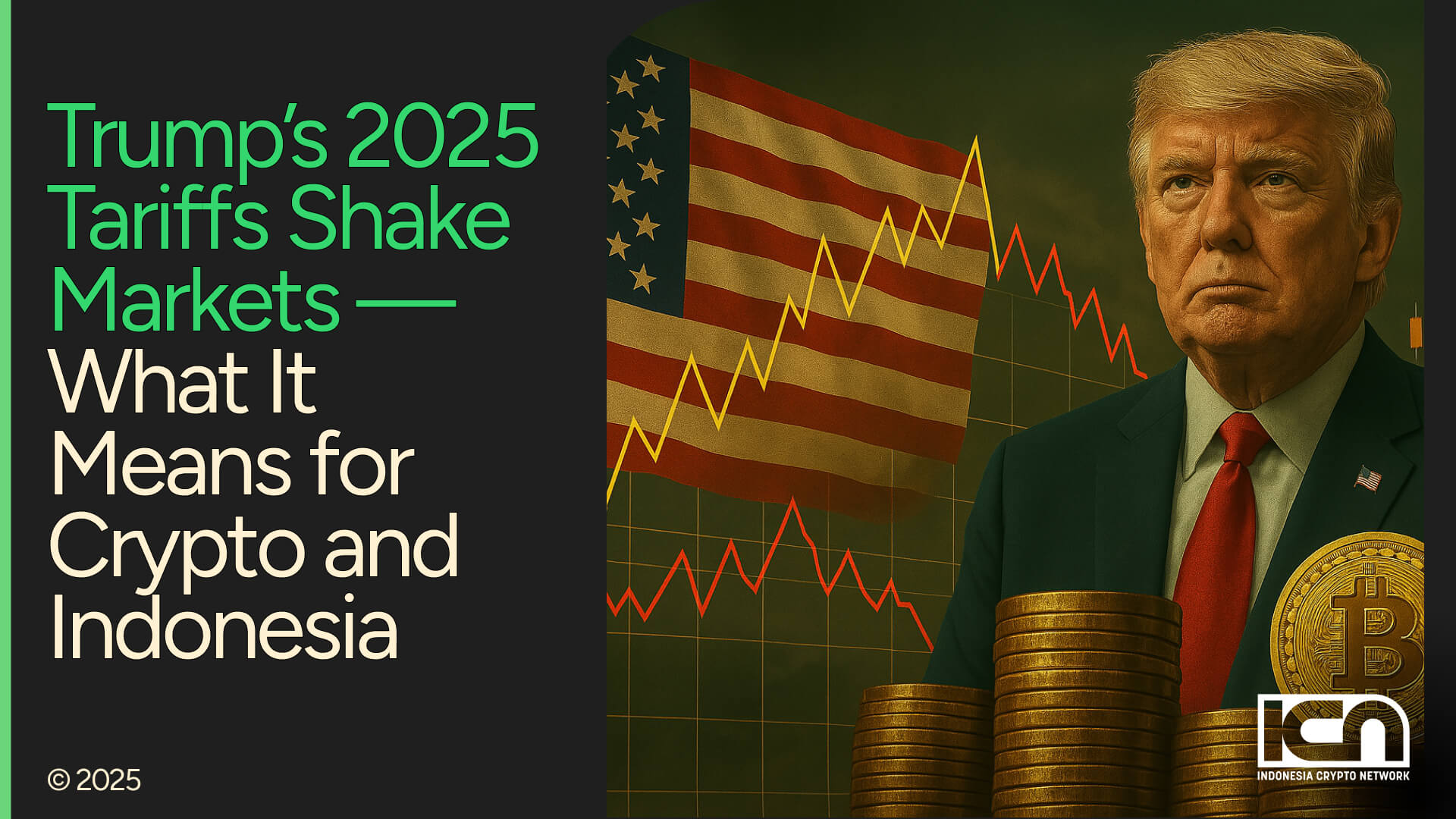In April 2025, the global economy was jolted by the return of a familiar disruptor: U.S. President Donald Trump’s aggressive tariff agenda. Announced as a universal 10% tax on all imports, the policy included sweeping surcharges targeting America’s key trading partners—especially in Asia.
Indonesia, Southeast Asia’s largest economy, was hit with a 32% effective tariff, focusing on critical sectors such as apparel, electronics, and footwear. China faced an even harsher 54%, followed by Vietnam (49%) and Cambodia (41%). The response was immediate: global equity markets plunged, signaling investor concern about a potential contraction in trade and regional competitiveness.
Among the hardest-hit markets was Indonesia. On April 8, the Indonesia Composite Index (IHSG) fell 9.19%—its steepest one-day drop in recent memory. Crypto markets weren’t immune. Bitcoin dropped 3.9%, and Ethereum fell 5.2%, tracking broader risk-off sentiment. The selloff reinforced what many in crypto already knew but often overlooked: decentralization doesn’t shield against macro volatility—especially when institutional capital is involved.
Crypto’s Physical and Political Weak Points
While crypto often promotes itself as disconnected from legacy systems, this shock showed how deeply entangled it still is with the real world. When geopolitical tensions rise, investor behavior across asset classes becomes predictable. Crypto gets sold off like any other risk asset. But it’s not just price—it’s infrastructure too.
For infrastructure-heavy segments—like mining, staking, and custody—tariffs on electronics can raise costs. Cross-border supply chains get slower and more expensive. Regulatory friction increases as governments tighten financial flows and enforce stricter compliance on fiat on-ramps, KYC providers, and custodians.
Trade wars also trigger ripple effects on data regulation, investment policy, and licensing standards. Crypto companies operating across multiple jurisdictions face more uncertainty, not less.
Indonesia Responds with Restraint — Not Retaliation
While some countries signaled retaliation, Indonesia’s reaction was measured. In its first official response, Chief Economic Minister Airlangga Hartarto stated.
“The approach was taken by considering the long-term interest of bilateral trade relations, as well as to maintain the investment climate and national economic stability.”
The government said it would gather business input, support affected sectors like apparel and footwear, and expand trade cooperation with Europe and ASEAN to reduce U.S. and China reliance. Rather than escalating tensions, Indonesia chose a path of stability and long-term thinking.
Indonesia Isn’t Immune—But It Is Moving Forward
To be clear, Indonesia still faces economic headwinds. The country’s export reliance is real, its financial markets remain volatile, and major regulatory changes are still in transition. But amid the noise, it continues to engage the crypto industry, rather than pull back.
Indonesia is home to over 21 million crypto users and ranks #3 globally in Chainalysis’ Crypto Adoption Index. The market is fueled by a mobile-first generation that’s adopting DeFi, NFTs, and blockchain tools at scale.
More importantly, a major shift is underway: by the end of 2025, Indonesia will move crypto oversight from Bappebti (commodities) to the Financial Services Authority (OJK). This change introduces stricter compliance expectations but also provides long-term clarity. For crypto companies, it’s not a shortcut—it’s a roadmap.
New Priorities for Crypto in Asia
Crypto firms are under pressure to rethink their Asia strategies. Vietnam and China now face heightened geopolitical scrutiny. Even Singapore faces increasing regulatory complexity.
Indonesia isn’t without its issues. But its direction is clear: continue integrating crypto into financial oversight, build national infrastructure like the Crypto Futures Exchange (CFX), and explore public-private collaboration on innovation—including CBDCs and regulatory sandboxes.
For companies seeking a long-term presence in the region, Indonesia offers a more transparent regulatory pathway and a large, growing crypto-native audience. It’s not about escaping risk—it’s about managing it with foresight.
Entering Indonesia Requires Work, Not Wishful Thinking
For crypto companies considering the Indonesian market, here’s what matters now:
- Do the legal homework. Regulatory transitions are underway. Align early with OJK frameworks and join associations like the Indonesian Blockchain Association.
- Reduce physical exposure. Use DePIN, Layer-2 networks, and modular architecture to stay agile.
- Engage locally. Crypto adoption is high, but so are expectations for education, compliance, and trust-building.
- Think regionally. Indonesia offers a potential launchpad into ASEAN—if approached strategically.
This isn’t an easy market. But it’s one where effort still counts.
Conclusion
The Trump tariffs of 2025 didn’t just disrupt trade—they highlighted the fragility of global crypto expansion strategies. Projects relying on favorable conditions, loose oversight, or cheap hardware now face a tougher reality.
Indonesia hasn’t been spared from that reality. It’s navigating economic uncertainty, market volatility, and a complex regulatory evolution. But it hasn’t closed its doors to crypto. It’s adjusting—on its own terms.
And that’s where Indonesia Crypto Network (ICN) comes in. As the country’s leading Web3 growth partner, ICN helps global projects localize, navigate regulation, and build real traction in Indonesia’s fast-changing market. With deep industry knowledge and access to one of the world’s most active crypto user bases, ICN is the bridge between global ambition and Indonesian execution.
Want to build in Asia without flying blind? Explore your next move in Indonesia with ICN.




